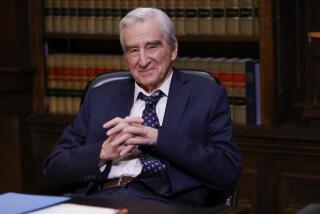‘McMillions’ turns the McDonald’s Monopoly scam into unmissable TV. Savor it
The story goes that in 1841, when Charles Dickens’ novel “The Old Curiosity Shop” was being published serially in Great Britain, American fans would crowd New York wharves, shouting to arriving ships to inquire about its luckless heroine, “What news of Little Nell?” In spite of the rise of streamers and their binge-based release model, there is no substitute for the mounting enthusiasm delayed gratification brings. As anyone who has scarfed down a pint of ice cream in one sitting knows — yes, yes — you can get to the bottom without having tasted a thing, where parceling out a treat might intensify its flavor.
In an age of Everything Coming at Once, HBO, still the gem of the premium cable ocean, has remained a publisher of serial stories, a maker of cliffhangers, building anticipation and prestige by drawing out the conversation over weeks and months and years — the audience for “Game of Thrones” or “Watchmen,” speculating in cyber and physical space, are the modern equivalent of crowds lining up for news of Little Nell.
For the record:
5:24 p.m. Feb. 10, 2020An earlier version of this article gave an incorrect premiere date for “Quiz.”
James Lee Hernandez and Brian Lazarte’s new six-part documentary, “McMillions,” which premiered Feb. 3, is HBO’s latest bid for your ongoing attention: Its twisty, many-fingered, onion-layered story is tailor-made for cliffhangers and progressive reveals. It tells the story of the McDonald’s Monopoly Game fraud, in which an ex-cop nicknamed Uncle Jerry — in an operation that went undetected from 1989 to 2001 and involved an ad hoc network of “recruiters” and semi-solid citizens willing to participate in what not all fully understood was thievery — managed to scam some $24 million in cash and prizes from the home of the Happy Meal.
If I am being vague, it is only to avoid spoilers, in the spirit of the series, which holds back information and skips around in time for dramatic effect. (As in many documentaries, time is an incidental subject: It shows us what its subjects, newly interviewed, have made of the intervening years and what the years have made of them.) Indeed, the basic facts were reported at the time, though the case was pushed from the front page and public consciousness by 9/11. More recently it was the subject of a 2018 Daily Beast story by Jeff Maysh, “How an Ex-Cop Rigged McDonald’s Monopoly Game and Stole Millions,” which within days became the subject of a bidding war for the film rights. (Fox won; Ben Affleck is scheduled to direct, Matt Damon to star.) Like many stories, it lay in its historical dustbin, dimly remembered, waiting for its moment to be become what can only be called entertainment, given an attractive form and narrative shape and filled in with illuminating human details.
This brand of long-form, real-life mystery story has its near roots in “Serial,” the 2014 true-crime podcast whose phenomenally popular first season re-investigated the 1999 murder of a Baltimore high school student, which spawned its own HBO docuseries in the bargain. But its more distant model is “The Staircase,” Jean-Xavier de Lestrade’s 2004 look at the murder of a North Carolina novelist’s wife (followed up with additional episodes in 2013 and again in 2018). It’s a full-blown genre now, inspiring Hollywood films, scripted miniseries and series-length parodies like NBC’s “Trial and Error” and Netflix’s “American Vandal.”
Every work of nonfiction is shaped by available resources, who shows up to talk and, in the case of film, how they talk and look and comport themselves. More than 50 people were indicted in this case, and it’s a sure bet that not all of them are as sympathetic or amusing as the ones who have agreed to meet here. Nevertheless, “McMillions” builds its story from an impressive number of voices, including FBI agents, McDonald’s executives, fraudsters and their family members (who in most cases are also ex-family members).
Significantly missing are Jerry Jacobson, the “Uncle Jerry” at the center of the scam, and Rick Dent, the agent in charge of the case, through agents Dent reported to are present. It makes a kind of hole in the story into which other characters rush, notably Doug Mathews, a talkative, eager-beaver young agent in the bureau’s Jacksonville, Fla., office — a backwater, Mathews, says, where “for big cases, man, you’re like duct-taping stuff together, just ‘cause you want to make it happen.” He would like you to know that there might have been no investigation without his interest. His colleagues regard him with an attitude halfway between amusement and bemusement.
Because some of these people can seem like caricatures, regarded as characters even by other characters, and because most appear to have survived with their lives more or less intact, it’s easy enough watch “McMillions” as a comedy, if one not untouched by violence and sorrow. The editing and underscoring certainly support the reading: A woman seen from afar falling down at a grave site, for example, is a shot the filmmakers might easily have left out — it contains no practical information — but put in anyway.
As a human interest story, the series is also compelling in ways that have nothing to do with the the scam itself, but rather with personal struggles and relationships, and how disordered lives may find new orders. As storytellers, Hernandez and Lazarte are more interested in human goodness than perversity — even the FBI agents speak of lower-level participants in the fraud as “good people” — and their epilogue is unexpectedly touching. Perhaps the most bracing aspect of “McMillions” is its workaday portrayal of FBI and justice professionals, who do their jobs with less rhetoric or judgment than one might expect, especially given the wild shots fired their way from a fortress White House.
Indeed, there is an incidental timeliness in a story about a bad apple and the barrel it spoiled. (Another game-fraud series is on the way, the scripted AMC-ITV co-production “Quiz,” about an attempt to cheat the British “Who Wants to Be a Millionaire?” due May 25, as well as Hulu’s upcoming “The Dropout,” about Elizabeth Holmes and the sham that was Theranos.) We are living through a time in which gaming the system is now just the system, in which cheaters prosper and whatever one gets away with is by definition OK because one has gotten away with it. “McMillions” is clear about the damage caused by even the “good people” who found themselves working for Uncle Jerry and may have imagined that they were doing no wrong, and that no one was getting hurt. (Though it seems the case that the farther along in the chain they were, the more likely they are to express regret.)
Meanwhile, waiting for episodes is not only good television, it’s good practice. Our desire for getting whatever we want whenever we want, or at least delivered within a day, does us — each of us and all of us — no good. I don’t mean to say that saving the world is in the HBO business plan. But a little delayed gratification isn’t a bad thing, especially where that next episode of “McMillions” is concerned: What news of Doug Mathews?
‘McMillions’
Where: HBO
When: 10 p.m. Monday
Rating: TV-14 (may be unsuitable for children younger than 14)
More to Read
The complete guide to home viewing
Get Screen Gab for everything about the TV shows and streaming movies everyone’s talking about.
You may occasionally receive promotional content from the Los Angeles Times.







